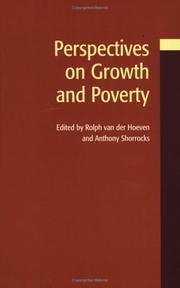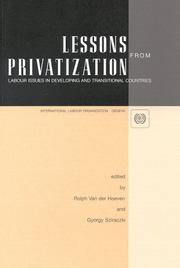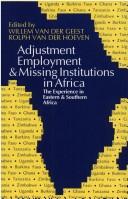| Listing 1 - 6 of 6 |
Sort by
|

ISBN: 928081091X 9280870521 0585485623 9780585485621 9789280810912 9789280870527 Year: 2003 Publisher: Tokyo New York United Nations University Press
Abstract | Keywords | Export | Availability | Bookmark
 Loading...
Loading...Choose an application
- Reference Manager
- EndNote
- RefWorks (Direct export to RefWorks)
Developing countries -- Economic policy -- Congresses. --- Developing countries -- Social policy -- Congresses. --- Economic development -- Congresses. --- Education and state -- Developing countries -- Congresses. --- Poverty -- Developing countries -- Congresses. --- Business & Economics --- Economic Theory --- Developing Countries --- 338.22 --- Economic development --- Poverty --- -Education and state --- -Education --- Education policy --- Educational policy --- State and education --- Social policy --- Endowment of research --- Destitution --- Wealth --- Basic needs --- Begging --- Poor --- Subsistence economy --- Development, Economic --- Economic growth --- Growth, Economic --- Economic policy --- Economics --- Statics and dynamics (Social sciences) --- Development economics --- Resource curse --- Economic policy. --- Social policy. --- Economische organisatieleer. Economisch beleid. Economische politiek --- Government policy --- -Economic policy. --- 338.22 Economische organisatieleer. Economisch beleid. Economische politiek --- -Development, Economic --- Education --- Education and state --- Developing countries --- Emerging nations --- Fourth World --- Global South --- LDC's --- Least developed countries --- Less developed countries --- Newly industrialized countries --- Newly industrializing countries --- NICs (Newly industrialized countries) --- Third World --- Underdeveloped areas --- Underdeveloped countries
Book
ISBN: 0333593545 0333593547 Year: 1994 Publisher: Basingstoke St. Martin's Press
Abstract | Keywords | Export | Availability | Bookmark
 Loading...
Loading...Choose an application
- Reference Manager
- EndNote
- RefWorks (Direct export to RefWorks)

ISBN: 9221094529 Year: 1997 Publisher: Geneva : International Labour Organization [i.e Office]
Abstract | Keywords | Export | Availability | Bookmark
 Loading...
Loading...Choose an application
- Reference Manager
- EndNote
- RefWorks (Direct export to RefWorks)
Privatization --- Industrial relations --- Privatisation --- Relations industrielles --- Government business enterprises --- Labor market --- Structural adjustment (Economic policy) --- Unemployment --- Employees --- Supply and demand
Book
ISBN: 1280028130 Year: 1999 Publisher: [Place of publication not identified] International Labour Office
Abstract | Keywords | Export | Availability | Bookmark
 Loading...
Loading...Choose an application
- Reference Manager
- EndNote
- RefWorks (Direct export to RefWorks)
This book identifies 'missing institutions' as a major reason for the often patchy implementation of structural reform policies. In most African countries the labour force is growing faster than new jobs, leading to increased informalization of the economy. Case studies concentrate on Kenya, Uganda, Zambia, Zimbabwe and Malawi, where less than ten per cent of the labour force work in the formal sector, as compared with some twenty to forty per cent in the 1960s. Public sector workers have been reduced but there have not been enough jobs to compensate in the rest of the formal sector. The education and training institutions also have difficulties in providing skills for the restructured markets.
Labor market --- Labor economics --- Business & Economics --- Labor & Workers' Economics --- Africa, Eastern --- Africa, Southern --- Economic policy. --- Economic conditions.

ISBN: 9221108589 Year: 1999 Publisher: Geneva : International Labour Office,
Abstract | Keywords | Export | Availability | Bookmark
 Loading...
Loading...Choose an application
- Reference Manager
- EndNote
- RefWorks (Direct export to RefWorks)
Labor market --- Labor economics --- Marché du travail --- Economie du travail --- Africa, Eastern --- Africa, Southern --- Afrique orientale --- Afrique australe --- Economic policy --- Economic conditions. --- Economic conditions --- Politique économique --- Conditions économiques
Multi

ISBN: 9780814784907 9780814792339 Year: 1989 Publisher: New York, N.Y. New York University Press
Abstract | Keywords | Export | Availability | Bookmark
 Loading...
Loading...Choose an application
- Reference Manager
- EndNote
- RefWorks (Direct export to RefWorks)
| Listing 1 - 6 of 6 |
Sort by
|

 Search
Search Feedback
Feedback About UniCat
About UniCat  Help
Help News
News